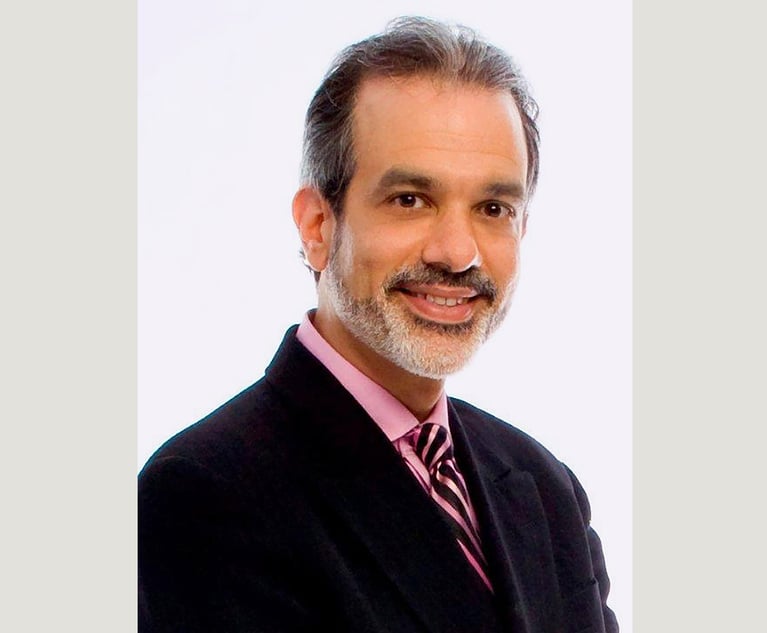What You Do in the Midnight Hour Can Greatly Impact Your Case
When attorneys handle a telephone call that pertains to a driving while under the influence of alcohol or drugs offense (DUI) offense, they should be aware that the actions they take at that very moment can dramatically change the outcome of their client's case.
August 24, 2022 at 09:00 AM
4 minute read
 Attorneys from time to time are awakened in the middle of the night by a telephone call regarding a client who is in the process of being arrested. When attorneys handle such a telephone call that pertains to a driving while under the influence of alcohol or drugs offense (DUI) offense, they should be aware that the actions they take at that very moment can dramatically change the outcome of their client's case.
Attorneys from time to time are awakened in the middle of the night by a telephone call regarding a client who is in the process of being arrested. When attorneys handle such a telephone call that pertains to a driving while under the influence of alcohol or drugs offense (DUI) offense, they should be aware that the actions they take at that very moment can dramatically change the outcome of their client's case.
Motorists arrested for a DUI offense in New York are typically asked to submit to a breath or a blood test to determine their blood alcohol concentration (BAC). This evidence is instrumental in a DUI prosecution and New York Vehicle and Traffic Law §1195 gives such evidence significant importance at trial. In short, it can result in prima facie evidence that will establish intoxication and make or break the government's case. When faced with the choice given to them by law enforcement to take or refuse a breath test, motorists often do not know what to do. In trying to make that decision, motorists sometimes reach out to an attorney for advice or assistance. In other instances, the client's family or friends may reach out to an attorney early on in the process to retain you to represent the person being charged.
New York's Vehicle and Traffic Law does not address whether a motorist arrested for driving while under the influence of alcohol has a right to consult with a lawyer prior to determining whether to consent to a breath test. At this early stage, the Sixth Amendment right to counsel has not yet attached because "official judicial proceedings" have not been commenced. Kirby v. Illinois, 406 U.S. 682, 688 (1972). New York courts have, however, long recognized that a motorist at this early stage does have a right to consult with a lawyer prior to determining whether to consent to a breath test. This has been described as a limited right to counsel. See People v. Gursey, 22 N.Y.2d 224 (1968). This limited right to counsel mandates that upon a request by an accused to speak with counsel, law enforcement "may not, without justification, prevent access between the criminal accused and his lawyer." Gursey, 22. N.Y. at 227.
This content has been archived. It is available through our partners, LexisNexis® and Bloomberg Law.
To view this content, please continue to their sites.
Not a Lexis Subscriber?
Subscribe Now
Not a Bloomberg Law Subscriber?
Subscribe Now
NOT FOR REPRINT
© 2025 ALM Global, LLC, All Rights Reserved. Request academic re-use from www.copyright.com. All other uses, submit a request to [email protected]. For more information visit Asset & Logo Licensing.
You Might Like
View All
'Careless Execution' of Presidential Pardons Freed Convicted Sex Trafficker, US Judge Laments

Two More Victims Alleged in New Sean Combs Sex Trafficking Indictment

'You Became a Corrupt Politician': Judge Gives Prison Time to Former Sen. Robert Menendez for Corruption Conviction
5 minute read
'It's a Matter of Life and Death:' Ailing Harvey Weinstein Urges Judge to Move Up Retrial
Trending Stories
Who Got The Work
J. Brugh Lower of Gibbons has entered an appearance for industrial equipment supplier Devco Corporation in a pending trademark infringement lawsuit. The suit, accusing the defendant of selling knock-off Graco products, was filed Dec. 18 in New Jersey District Court by Rivkin Radler on behalf of Graco Inc. and Graco Minnesota. The case, assigned to U.S. District Judge Zahid N. Quraishi, is 3:24-cv-11294, Graco Inc. et al v. Devco Corporation.
Who Got The Work
Rebecca Maller-Stein and Kent A. Yalowitz of Arnold & Porter Kaye Scholer have entered their appearances for Hanaco Venture Capital and its executives, Lior Prosor and David Frankel, in a pending securities lawsuit. The action, filed on Dec. 24 in New York Southern District Court by Zell, Aron & Co. on behalf of Goldeneye Advisors, accuses the defendants of negligently and fraudulently managing the plaintiff's $1 million investment. The case, assigned to U.S. District Judge Vernon S. Broderick, is 1:24-cv-09918, Goldeneye Advisors, LLC v. Hanaco Venture Capital, Ltd. et al.
Who Got The Work
Attorneys from A&O Shearman has stepped in as defense counsel for Toronto-Dominion Bank and other defendants in a pending securities class action. The suit, filed Dec. 11 in New York Southern District Court by Bleichmar Fonti & Auld, accuses the defendants of concealing the bank's 'pervasive' deficiencies in regards to its compliance with the Bank Secrecy Act and the quality of its anti-money laundering controls. The case, assigned to U.S. District Judge Arun Subramanian, is 1:24-cv-09445, Gonzalez v. The Toronto-Dominion Bank et al.
Who Got The Work
Crown Castle International, a Pennsylvania company providing shared communications infrastructure, has turned to Luke D. Wolf of Gordon Rees Scully Mansukhani to fend off a pending breach-of-contract lawsuit. The court action, filed Nov. 25 in Michigan Eastern District Court by Hooper Hathaway PC on behalf of The Town Residences LLC, accuses Crown Castle of failing to transfer approximately $30,000 in utility payments from T-Mobile in breach of a roof-top lease and assignment agreement. The case, assigned to U.S. District Judge Susan K. Declercq, is 2:24-cv-13131, The Town Residences LLC v. T-Mobile US, Inc. et al.
Who Got The Work
Wilfred P. Coronato and Daniel M. Schwartz of McCarter & English have stepped in as defense counsel to Electrolux Home Products Inc. in a pending product liability lawsuit. The court action, filed Nov. 26 in New York Eastern District Court by Poulos Lopiccolo PC and Nagel Rice LLP on behalf of David Stern, alleges that the defendant's refrigerators’ drawers and shelving repeatedly break and fall apart within months after purchase. The case, assigned to U.S. District Judge Joan M. Azrack, is 2:24-cv-08204, Stern v. Electrolux Home Products, Inc.
Featured Firms
Law Offices of Gary Martin Hays & Associates, P.C.
(470) 294-1674
Law Offices of Mark E. Salomone
(857) 444-6468
Smith & Hassler
(713) 739-1250






